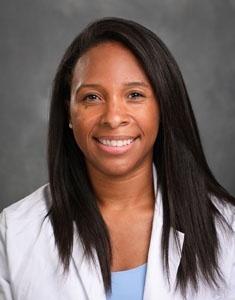
Lauren Chamberlain, DO, had always been interested in the brain, but a rotation in medical school convinced her that pediatric neurology was the field for her. Now she’s spending a year with the Duke Neurology Department as part of her residency training. In this week’s Spotlight interview, Chamberlain talks to us about residency during the era of COVID-19, her experience as a competitive gymnast (including why it’s easier to tumble backwards than forwards), and her plans to focus on epilepsy and sleep medicine in the future.
What are your current responsibilities within the neurology Department? What does a typical day for you look like?
My current role as a neurology resident requires that I rotate to a different service or specialty within neurology and care for adult patients. I am currently on the consult service as the late person, therefore my typical day in the hospital starts at 9 a.m. and ends approximately at 7 p.m. Furthermore, when a team consults neurology, or when someone has acute stroke-like symptoms, I am paged to assist with reaching a diagnosis.
How and when did you first become interested in pediatric neurology? What do you most enjoy about the field?
The brain itself has always fascinated me for as long as I can remember. The problem was that I only knew about adult neurology and I was only interested in caring for children. It was not until the end of my third year of medical school when I first discovered the field of pediatric neurology. I remember my first pediatric neurology rotation. It was outpatient and I loved every single day of that rotation. The pathology was fascinating, most of the diseases were treatable and the exams were fun for both myself and the patients.
How have your residency and personal life been affected by the COVID-19 pandemic? What’s one resource or strategy that’s helped you cope?
Early this March, one of my electives was switched to a home elective. For 2 weeks, I was home with my dog learning pediatric cardiology. In addition, our pediatric census was decreased to almost 0 for a few months. Now it’s a matter of taking a few minutes to wait for the COVID-19 test results or don and doff all the PPE if needed. As for how my personal life has been affected, my husband and I have used this time to go on hikes in the surrounding area to just “get away.” We also have gotten into the habit of ordering take-out more often to support local restaurants.
You were a competitive gymnast through college and even taught gymnastics as a medical student. What do you enjoy most about gymnastics, and what’s one thing most people don’t know about the sport?
Gymnastics is a great sport! It is both an individual sport and a team sport. It teaches you to trust yourself and your abilities as well as discipline. You are also surrounded by team members that you spend so much time around that they become your family. One thing that most people do not know about gymnastics is that tumbling backwards feels more natural than forwards.
What plans (if any) do you have for after you complete your residency? If you could have any job in the world, what would it be?
After residency I hope to be working at a major hospital focusing on epilepsy and sleep medicine after I complete my residency. My dream job would be a neurologist for the USA Olympic Gymnastics Team.
What other passions or hobbies do you have outside of the Department?
I love food! I enjoy cooking after work and trying new recipes. I also love running and going on hikes with my husband and dog.